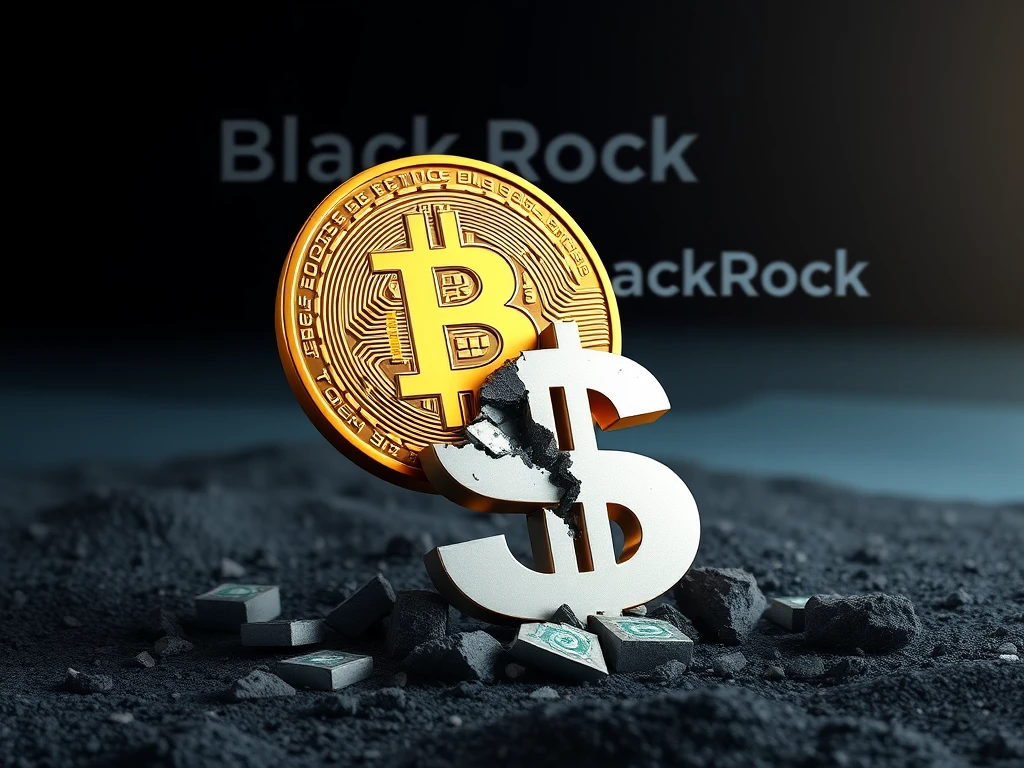Urgent Warning: BlackRock CEO Reveals How Bitcoin Could Dethrone US Dollar Dominance

Is the reign of the US dollar as the world’s reserve currency under threat? A startling revelation from BlackRock CEO Larry Fink suggests that Bitcoin, the pioneering cryptocurrency, could be the unexpected contender poised to challenge the dollar’s long-held supremacy. In his annual letter to investors, Fink didn’t mince words, highlighting the escalating US national debt as a critical vulnerability that could inadvertently propel Bitcoin and other digital assets into the limelight. Could we be witnessing the dawn of a new financial era where decentralized currencies gain prominence due to concerns surrounding traditional fiat? Let’s delve into Fink’s insights and explore the potential implications for the future of global finance.
BlackRock’s Stark Outlook on US Dollar Dominance and Bitcoin’s Rise
Larry Fink’s annual letter delivered a powerful message: the unchecked growth of US debt is not just an economic concern, it’s a potential catalyst for a seismic shift in the global financial landscape. He argues that if the United States fails to rein in its mounting debt, investors might increasingly perceive Bitcoin as a safer haven compared to the dollar. This perspective from the head of the world’s largest asset manager carries significant weight, prompting serious consideration about the future of the US Dollar Dominance.
Fink emphasized the innovative nature of decentralized finance (DeFi), praising its ability to create “faster, cheaper, and more transparent” markets. However, he also underscored the paradoxical risk: this very innovation could erode America’s economic advantage if Bitcoin gains traction as a more dependable store of value. Here’s a breakdown of the key concerns driving this narrative:
- Soaring US Debt: As reported by Trading Economics, US debt has surged to a staggering 122.3% of GDP in 2023, a significant jump from 105% in 2018. This rapid increase raises alarms about the long-term fiscal health of the nation.
- Credit Rating Outlook Downgrade: Moody’s Ratings, while maintaining the US’s AAA credit rating, has revised its outlook to negative. This indicates a potential future downgrade, reflecting concerns about the country’s fiscal trajectory.
- Exponential Debt Growth: The US Joint Economic Committee reveals that the gross national debt has ballooned to $36.2 trillion as of March 5, 2024. It’s growing at an alarming rate of $4.9 billion per day over the past year and a massive $12.8 trillion in the last five years.
- Default Risk: The Bipartisan Policy Center warns of a potential US debt default as early as July 2025, adding another layer of urgency to the situation.
These factors paint a concerning picture, suggesting that the foundations of US Dollar Dominance might be shakier than previously assumed. In this environment of economic uncertainty, could Bitcoin genuinely emerge as a viable alternative?
Bitcoin: A Safe Haven Amidst Fiat Currency Concerns?
Bitcoin has long been championed as a digital gold, a refuge for investors seeking to escape the inflationary pressures and potential instability of traditional fiat currencies. The looming debt ceiling crisis in the US further strengthens this narrative. Many believe that the end of debt ceiling suspensions could trigger a significant Bitcoin price surge as investors flock to its perceived safety. Larry Fink’s perspective aligns with this sentiment, suggesting that the dangers associated with national debt could be a powerful catalyst for increased Bitcoin adoption.
However, it’s crucial to maintain a balanced perspective. While Bitcoin presents an intriguing alternative, some argue that stablecoins, which are pegged to the US dollar, could paradoxically strengthen the dollar’s global influence within the crypto space. The interplay between Bitcoin, stablecoins, and the traditional financial system is complex and constantly evolving.
Tokenization: A Revolutionary Force in Finance
Beyond the Bitcoin versus dollar debate, Fink’s letter also highlighted the transformative potential of tokenization. He proclaims, “tokenization is democratization,” underscoring how this technological innovation is poised to revolutionize investing. Tokenization, the process of representing real-world assets on a blockchain, offers a multitude of advantages:
- Instant Transactions: Tokenization enables immediate buying, selling, and transferring of assets, eliminating the delays associated with traditional financial systems.
- Reduced Paperwork: Cumbersome paperwork and lengthy waiting periods become relics of the past as transactions are streamlined through blockchain technology.
- Increased Liquidity: Billions of dollars currently tied up in settlement delays could be instantly reinvested, injecting greater liquidity and dynamism into the economy.
- 24/7 Markets: Tokenized markets can operate continuously, eliminating the constraints of traditional market hours.
- Democratized Access: Tokenization can broaden access to investment opportunities, shareholder voting, and yield generation, fostering greater financial inclusion.
The real-world asset (RWA) tokenization market is already gaining significant traction. According to RWA.xyz, it currently stands at $19.6 billion, with approximately 93,000 asset holders and 174 issuers. Industry forecasts predict explosive growth, projecting the market to reach a staggering $4 trillion to $30 trillion by 2030. BlackRock’s own BUIDL fund, a tokenized real-world asset fund, is currently the largest in the market, further signaling the company’s belief in this burgeoning sector.
Conclusion: Navigating the Shifting Sands of Global Finance
Larry Fink’s warning serves as a crucial wake-up call. The confluence of escalating US debt and the rise of innovative technologies like Bitcoin and tokenization is reshaping the global financial landscape. While the US Dollar Dominance has been a cornerstone of the global economy for decades, its future is increasingly uncertain. Bitcoin, alongside other digital assets, presents a compelling alternative store of value in an era of fiscal anxieties. Furthermore, the transformative power of tokenization promises to democratize finance and unlock unprecedented levels of efficiency and accessibility. As we move forward, understanding these trends and adapting to this evolving financial paradigm will be paramount for investors, businesses, and policymakers alike. The potential dethroning of the US dollar by Bitcoin may still be a future scenario, but the seeds of change are undeniably being sown today.










